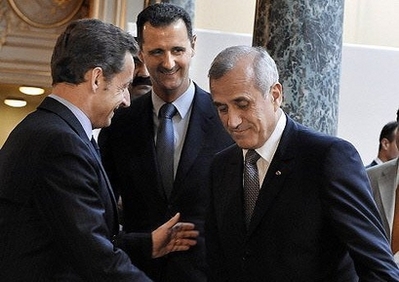 PARIS (AFP) - Lebanon and Syria have agreed to establish diplomatic relations, opening embassies in each others' capitals for the first time since their independence from colonial rule. French President Nicolas Sarkozy announced the landmark decision Saturday following talks with Syrian President Bashar al-Assad and Lebanese President Michel Sleiman, whose election in May ended a drawn-out political crisis in Lebanon. "For France, this is historic progress," Sarkozy told a press conference. "Of course there are a number of legal questions that have to be settled... but for us... this announcement is absolutely historic. It is great news for all those who love Lebanon and are concerned by developments there," he said. Presidents Assad and Sleiman confirmed the news at a joint press conference later on Saturday. "Our position is that there is no problem for the opening of embassies between Syria and Lebanon," said Assad. "If Lebanon is willing to exchange embassies, we have no objections to doing it," he added. For Lebanon, Sleiman confirmed that the two governments were going to "work together to put everything in motion as soon as possible."
PARIS (AFP) - Lebanon and Syria have agreed to establish diplomatic relations, opening embassies in each others' capitals for the first time since their independence from colonial rule. French President Nicolas Sarkozy announced the landmark decision Saturday following talks with Syrian President Bashar al-Assad and Lebanese President Michel Sleiman, whose election in May ended a drawn-out political crisis in Lebanon. "For France, this is historic progress," Sarkozy told a press conference. "Of course there are a number of legal questions that have to be settled... but for us... this announcement is absolutely historic. It is great news for all those who love Lebanon and are concerned by developments there," he said. Presidents Assad and Sleiman confirmed the news at a joint press conference later on Saturday. "Our position is that there is no problem for the opening of embassies between Syria and Lebanon," said Assad. "If Lebanon is willing to exchange embassies, we have no objections to doing it," he added. For Lebanon, Sleiman confirmed that the two governments were going to "work together to put everything in motion as soon as possible."
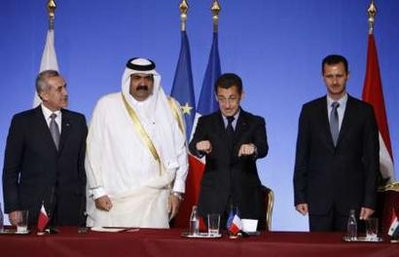 According to Suleiman, the legal and administrative arrangements needed to implement "this agreement would be taken as soon as possible in coordination between the two capitals," Beirut and Damascus. "We look forward to tackling the topic of demarcating the Lebanese-Syrian borders through the required mechanism based on the brotherly relations between the two sisterly states," Suleiman said. He said Lebanon is "committed to regaining its full sovereignty over the Shebaa Farms," an area occupied by Israel since 1967. Answering reporters' questions as to whether Lebanon would go into peace talks with Israel, Suleiman said: "We expect Israel to implement international resolutions, especially UN Security Council Resolution 1701 that was adopted two years ago and Israel has not pulled out of the Ghajar (village) Shebaa Farms and Kfar Shouba hills." On May 24, 2000, Israel withdrew its troops from a large territory in southern Lebanon, which it had been occupying since 1978. A significant issue relating to the withdrawal remains unsettled. This relates to the status of certain villages and adjacent land on the eastern side of Alsheikh Mountain, known as the Shebaa Farms. The Lebanese government advised the United Nations that it considers the area to be Lebanese territory and that, as such, the withdrawal must encompass it. Israel insists that the land was captured from Syria in 1967 and its fate should be discussed in future peace talks between Israel and Damascus. Meanwhile Druze leader Walid Jumblatt, a key member of Lebanon's ruling majority, lashed out at France for receiving the Syrian president. "Receiving the head of the Syrian regime by the French leadership is a clear disrespect to the feelings of the Lebanese people and its prisoners who are still held in Syria," Jumblatt told a group of his followers on Sunday. No-one knows exactly how many Lebanese political prisoners are in Syrian jails. Syria and Lebanon's former pro-Syrian president Emile Lahoud have denied there are any. They claim all political prisoners were released in December 2000. But Ghazi Aad, head of a group called SOLIDE (Support of Lebanese in Detention and Exile) said he has been working with the families of detainees for 15 years. He added that his organization has files on 176 known detainees in Syrian prisons and there could be more.
According to Suleiman, the legal and administrative arrangements needed to implement "this agreement would be taken as soon as possible in coordination between the two capitals," Beirut and Damascus. "We look forward to tackling the topic of demarcating the Lebanese-Syrian borders through the required mechanism based on the brotherly relations between the two sisterly states," Suleiman said. He said Lebanon is "committed to regaining its full sovereignty over the Shebaa Farms," an area occupied by Israel since 1967. Answering reporters' questions as to whether Lebanon would go into peace talks with Israel, Suleiman said: "We expect Israel to implement international resolutions, especially UN Security Council Resolution 1701 that was adopted two years ago and Israel has not pulled out of the Ghajar (village) Shebaa Farms and Kfar Shouba hills." On May 24, 2000, Israel withdrew its troops from a large territory in southern Lebanon, which it had been occupying since 1978. A significant issue relating to the withdrawal remains unsettled. This relates to the status of certain villages and adjacent land on the eastern side of Alsheikh Mountain, known as the Shebaa Farms. The Lebanese government advised the United Nations that it considers the area to be Lebanese territory and that, as such, the withdrawal must encompass it. Israel insists that the land was captured from Syria in 1967 and its fate should be discussed in future peace talks between Israel and Damascus. Meanwhile Druze leader Walid Jumblatt, a key member of Lebanon's ruling majority, lashed out at France for receiving the Syrian president. "Receiving the head of the Syrian regime by the French leadership is a clear disrespect to the feelings of the Lebanese people and its prisoners who are still held in Syria," Jumblatt told a group of his followers on Sunday. No-one knows exactly how many Lebanese political prisoners are in Syrian jails. Syria and Lebanon's former pro-Syrian president Emile Lahoud have denied there are any. They claim all political prisoners were released in December 2000. But Ghazi Aad, head of a group called SOLIDE (Support of Lebanese in Detention and Exile) said he has been working with the families of detainees for 15 years. He added that his organization has files on 176 known detainees in Syrian prisons and there could be more. 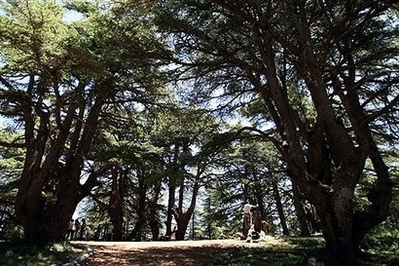 by Rana Moussaoui AYTARUN, Lebanon (AFP) - The large building near the border with Israel was already earmarked to be a green pioneer in Lebanon when it was blown apart by two missiles during the short sharp summer war of 2006. Now the demolished building has been rebuilt -- and with it a ground-breaking environmental project has risen from its own ashes. In a country with serious waste management problems, the war-ravaged small town of Aytarun in the south lies in the vanguard of recycling, setting an example it is hoped will be followed by others. Located just metres (yards) from the frontier, Aytarun was devastated by the 34-day war two years ago. On the village's edge is the Centre for Solid Waste Management a 700-square-metre (875-square-yard) structure rebuilt with Italian assistance after the conflict.
by Rana Moussaoui AYTARUN, Lebanon (AFP) - The large building near the border with Israel was already earmarked to be a green pioneer in Lebanon when it was blown apart by two missiles during the short sharp summer war of 2006. Now the demolished building has been rebuilt -- and with it a ground-breaking environmental project has risen from its own ashes. In a country with serious waste management problems, the war-ravaged small town of Aytarun in the south lies in the vanguard of recycling, setting an example it is hoped will be followed by others. Located just metres (yards) from the frontier, Aytarun was devastated by the 34-day war two years ago. On the village's edge is the Centre for Solid Waste Management a 700-square-metre (875-square-yard) structure rebuilt with Italian assistance after the conflict.
The centre refuses to dump any waste at all. "Everything is recycled, nothing is thrown away," says Ziad Abichaker of Cedar Environmental, a group that specialises in recycling technology. "We wanted to create the example of a rural town which not only gets rid of its waste but also uses it to benefit organic agriculture. "Some things are stored as we research and develop outlets for them," Abichaker adds, saying shoes can be used in a special cement for the manufacture of public benches. The facility's five employees patiently sort through potato peelings, plastic bottles and old clothing before recycling proper can begin. In many rural areas of Lebanon municipalities burn solid waste, causing an unbearable stench and often sparking wildcat forest fires. "People did not like the smell of burning rubbish. This project is a blessing for them," Abichaker says of the traditional method of incineration. Sawsan Bou Fakhreddine of the Association for Forests, Development and Conservation says domestic waste forms 90 percent of all the country's rubbish.
The opposition took the coveted posts of foreign minister, telecommunications minister and deputy premier in the new Cabinet, while the ruling bloc kept the Finance Ministry. The president, who himself only took office four days after the Doha accord, filling a post left vacant since November, made three appointments, including Elias Murr, who kept the defense portfolio despite opposition reservations. He also appointed lawyer and electoral law expert Ziyad Baroud to head the Interior Ministry, which will be responsible for organizing legislative elections next year. Finance Minister Mohammad Shatah, who was appointed by the ruling bloc, served as Siniora's senior adviser in the previous cabinet. The government includes one woman, MP Bahia Hariri, sister of slain former Prime Minister Rafik Hariri. She is to head the Education Ministry. Free Patriotic Movement leader MP Michel Aoun, whose party had not been represented in the previous government, took four posts in the new one, plus the deputy premiership. Hizbullah was allocated three seats in the Cabinet, but only one of them went to a Hizbullah member - Labor Minister Mohammad Fneish.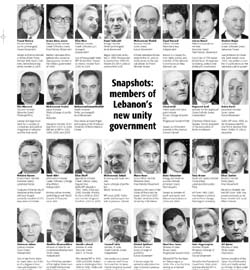 By Hussein Abdallah, BEIRUT: Lebanon announced a 30-member national unity government on Friday after almost five weeks of disputes over the distribution of portfolios. The lineup was announced in a decree signed by President Michel Sleiman and Prime Minister Fouad Siniora following a short meeting between them and Parliament Speaker Nabih Berri. The formation of the Cabinet came in line with the accord sealed in Doha on May 21 which allocated 16 cabinet seats to the parliamentary majority, 11 to the opposition, and three to the president.
By Hussein Abdallah, BEIRUT: Lebanon announced a 30-member national unity government on Friday after almost five weeks of disputes over the distribution of portfolios. The lineup was announced in a decree signed by President Michel Sleiman and Prime Minister Fouad Siniora following a short meeting between them and Parliament Speaker Nabih Berri. The formation of the Cabinet came in line with the accord sealed in Doha on May 21 which allocated 16 cabinet seats to the parliamentary majority, 11 to the opposition, and three to the president.
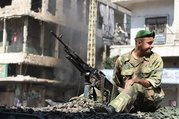 by Omar Ibrahim TRIPOLI, Lebanon (AFP) - Deadly gunbattles between rival sectarian factions in Lebanon's northern city of Tripoli ended Thursday as the army reinforced troop numbers to shore up a fragile ceasefire, an AFP correspondent said. Fighting that erupted late on Tuesday in the northeastern Bab al-Tebbaneh and Jabal Mohsen districts of the port city died down early Thursday when dozens of army vehicles moved into the flashpoint areas. The fighting, which claimed the lives of four people and left 58 wounded, had raged into the flashpoint areas. The fighting, which claimed the lives of four people and left 58 wounded, had raged into the night despite a ceasefire that was supposed to come into effect at 8:00 pm (1700 GMT) on Wednesday "In order to put an end to the breach of residents' security, the army command has announced that it is reinforcing its presence in the sensitive areas," an army statement said. "The army will confront those who fire first and calls on all parties to show calm and allow the military to take control of the situation," it added.
by Omar Ibrahim TRIPOLI, Lebanon (AFP) - Deadly gunbattles between rival sectarian factions in Lebanon's northern city of Tripoli ended Thursday as the army reinforced troop numbers to shore up a fragile ceasefire, an AFP correspondent said. Fighting that erupted late on Tuesday in the northeastern Bab al-Tebbaneh and Jabal Mohsen districts of the port city died down early Thursday when dozens of army vehicles moved into the flashpoint areas. The fighting, which claimed the lives of four people and left 58 wounded, had raged into the flashpoint areas. The fighting, which claimed the lives of four people and left 58 wounded, had raged into the night despite a ceasefire that was supposed to come into effect at 8:00 pm (1700 GMT) on Wednesday "In order to put an end to the breach of residents' security, the army command has announced that it is reinforcing its presence in the sensitive areas," an army statement said. "The army will confront those who fire first and calls on all parties to show calm and allow the military to take control of the situation," it added.
Militants armed with rockets, sniper rifles and grenades fought in the streets on Wednesday, causing panicked residents to flee and shops and schools to close. The dead included two brothers killed by snipers, a Palestinian nurse and a resident of the Jabal Mohsen district which is dominated by members of the Alawite community, an offshoot of Shiite Islam, which support the opposition. The latest unrest followed the eruption of similar battles two weeks ago in Tripoli, Lebanon's second largest city after the capital Beirut, that left nine people dead and dozens wounded.
Khazen History


Historical Feature:
Churches and Monasteries of the Khazen family

St. Anthony of Padua Church in Ballouneh
Mar Abda Church in Bakaatit Kanaan
Saint Michael Church in Bkaatouta
Saint Therese Church in Qolayaat
Saint Simeon Stylites (مار سمعان العامودي) Church In Ajaltoun
Virgin Mary Church (سيدة المعونات) in Sheilé
Assumption of Mary Church in Ballouneh
1 - The sword of the Maronite Prince
2 - LES KHAZEN CONSULS DE FRANCE
3 - LES MARONITES & LES KHAZEN
4 - LES MAAN & LES KHAZEN
5 - ORIGINE DE LA FAMILLE
Population Movements to Keserwan - The Khazens and The Maans
ما جاء عن الثورة في المقاطعة الكسروانية
ثورة أهالي كسروان على المشايخ الخوازنة وأسبابها
Origins of the "Prince of Maronite" Title
Growing diversity: the Khazin sheiks and the clergy in the first decades of the 18th century
Historical Members:
Barbar Beik El Khazen [English]
Patriach Toubia Kaiss El Khazen(Biography & Life Part1 Part2) (Arabic)
Patriach Youssef Dargham El Khazen (Cont'd)
Cheikh Bishara Jafal El Khazen
Patriarch Youssef Raji El Khazen
The Martyrs Cheikh Philippe & Cheikh Farid El Khazen
Cheikh Nawfal El Khazen (Consul De France)
Cheikh Hossun El Khazen (Consul De France)
Cheikh Abou-Nawfal El Khazen (Consul De France)
Cheikh Francis Abee Nader & his son Yousef
Cheikh Abou-Kanso El Khazen (Consul De France)
Cheikh Abou Nader El Khazen
Cheikh Chafic El Khazen
Cheikh Keserwan El Khazen
Cheikh Serhal El Khazen [English]
Cheikh Rafiq El Khazen [English]
Cheikh Hanna El Khazen
Cheikha Arzi El Khazen
Marie El Khazen